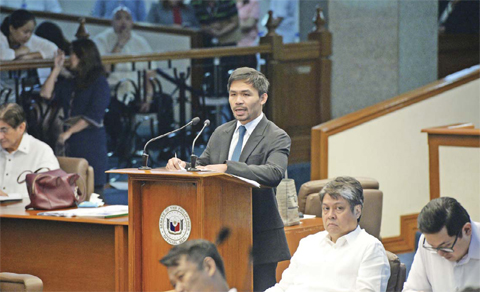 MANILA: Philippine boxing icon-turned-senator Manny Pacquiao delivers his privilege speech on restoration of the death penalty during a session at the senate in Manila yesterday. — AFP
MANILA: Philippine boxing icon-turned-senator Manny Pacquiao delivers his privilege speech on restoration of the death penalty during a session at the senate in Manila yesterday. — AFPMANILA: Philippine boxing icon-turned-senator Manny Pacquiao used the Bible to defend restoring the death penalty for drug traffickers as "approved by God", backing a controversial proposal of President Rodrigo Duterte. The eight-division champion and devout evangelical Christian used his first senate speech to argue for capital punishment, calling it lawful and moral "especially in the eyes of God". "When the government punishes, it's not an individual act. That's approved by God. That's what the Bible says", Pacquiao said. "Having read the Bible on a regular basis, I am convinced that God is not just a God of mercy but he is also a God of justice."
Pacquiao was elected to the senate in May on the back of his popularity as a sports star among Filipinos, who consider him a national hero. He and Duterte are political allies and both hail from the southern Philippines. Duterte has declared a bloody crackdown on crime, especially illegal drugs, telling police to shoot drug suspects. Since Duterte assumed office on June 30, police have reported killing over 400 drug suspects while the country's largest broadcaster ABS-CBN put the death toll at 852 to include reported summary executions.
The Philippines abolished the death penalty in 2006 following staunch opposition from the Catholic Church, the religion of 80 percent of Filipinos. But Duterte has vowed to introduce executions by hanging for "retribution". Pacquiao said yesterday he also preferred death by hanging or firing squad to reduce drug-related crimes. Asked by a colleague if this was because hanging was cheaper than lethal injection, Pacquiao said in jest: "You'll just kick the chair. We can also say the chair was just knocked down."
Pacquiao said he filed several bills on the death penalty including for drug crimes, rape and murder because Philippine laws "lacked teeth". But he did not answer questions on whether there were any studies showing that the death penalty led to lower crime rates. In his 20-minute speech, Pacquiao repeatedly quoted Bible passages, prompting another colleague to refer to him as a "pastor". He said he saw no contradiction between his beliefs and his support for the death penalty. Addressing critics of the proposal, Pacquiao said: "God allows the death penalty to discipline the people and to punish those wrongdoers."
Officials surrender
Meanwhile, dozens of Philippine government and police officials turned themselves in yesterday, a day after President Rodrigo Duterte linked them to the drugs trade, stepping up a war on narcotics that has killed hundreds since he took office in June. More than 400 suspected drug dealers have been killed by police across the Philippines since Duterte took over, officials say. Broadcaster ABS-CNN put the number at over 800, though this includes executions by anonymous vigilantes.
Yesterday, 27 mayors and 31 police officers, including a colonel, went to the national police office in the capital, Manila, to clear their names, fearing the president's order to hunt them down if they failed to surrender within 24 hours. Several local officials reported to regional police offices to beat the deadline set by Duterte, who won the elections in May on a single platform of fighting crime and drugs. On Sunday, he identified about 160 officials in a name-and-shame campaign. "I want to change," a Cebu-based businessman tagged as a top-level drug trafficker told reporters after he met national police chief Ronald dela Rosa.
Nicknamed "the punisher" and "Duterte Harry" for his brutal fight on crime, Duterte has hit back at activists incensed by the surge in the killings of suspected drug traffickers.
Alarmed human rights groups have urged the United Nations to condemn the rise in extrajudicial killings. The Philippine Senate is to hold a legislative inquiry. Dela Rosa reprimanded the police officers on Duterte's list, threatening to kill them if they continued to protect drug traders and resell seized drugs. At one point, he challenged them to a fistfight.
"I am mad with what is happening," Dela Rosa said in a speech to local officials and police. "I am ashamed. We should be the ones arresting these people, but we are protecting them. I will kill you if you will not change." All police officers linked to the drug trade were disarmed, investigated and could face criminal and administrative cases if there was strong evidence, said national police spokesman Dionardo Carlos. "They will be accorded due process," he added. Besides local officials and police officers, Duterte's list included two retired police generals, soldiers, paramilitary members, judges and a former lawmaker.- Agencies










